"Observing quasars is like observing the exhaust fumes of a car from a great distance and then trying to figure out what is going on under the hood." -Carole Mundell
Have you been tunes in to Starts With A Bang during this past week? The first full week of January brings with it the annual American Astronomical Society's giant meeting, and some of the most important discoveries and developments of the year! If you missed anything, here's what we've covered:
- Is interstellar travel possible? (for Ask Ethan),
- A distant galaxy cluster reveals the power of Einstein's gravity (for Mostly Mute Monday),
- The closest star system to us doesn't have any planets (yet), after all,
- Why are Pluto and Charon so different?,
- Kepler found its longest-period planet ever,
- Why cosmic inflation's last great prediction may fail, and
- NASA's Fermi satellite completes map of the sky; reveals unknown monster.
I've also, in my time away at the meeting (again, something your support on Patreon helps enable) gotten a number of exclusive interviews and stories about discoveries and upcoming missions, and they'll be revealed throughout the month on Starts With A Bang! My book, for those of you ordering from Amazon, will be in stock and shipping in just a couple of weeks (you can already download it on Kindle), and if you want it for your class, leave me a note and I can get you/your school/your students 30% discounted educator pricing! And now for the main event: your comments of the week!
From Denier on magnetism and the interstellar medium: "Sorry to rain on everyone’s parade, but the interstellar medium at high speed is nasty. Not only is there intense cosmic ray radiation, but a spacecraft striking random hydrogen atoms at anything over about 0.5c creates more radiation. The level of magnetic shielding needed in that environment would wreak havoc on our biology. It is not just the iron in our blood, but even the water that makes up more than 60% of our bodies is magnetic."
Sure, a magnetic field of incredible magnitude for a long duration would be necessary at high-speeds in the interstellar medium to prevent collisions with ions; ionizing radiation at high speeds is dangerous and needs to be avoided. So the standard idea is to generate a magnetic field outside the spacecraft and then to shoot any neutral atoms with a laser to ionize them. But, Denier notes, something bad could happen to you, like -- for instance -- what happens to this frog at the National High Magnetic Field Laboratory in Tallahassee.
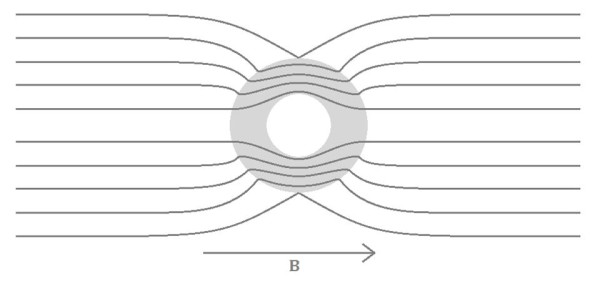 Image credit: Mumetal®, via http://mumetal.co.uk/?p=106.
Image credit: Mumetal®, via http://mumetal.co.uk/?p=106.
As long as you create a more efficient path for the magnetic field lines to travel through the hull of your spacecraft (rather than through the inhabited interior) you won't have any problems to the humans inside. I am well aware than not all of the problems associated with interstellar travel are easy to solve, but I'm pleased to inform you that this one is!
From Samuel J. Lawson on interstellar travel: "The section on warp drive doesn’t make mention of the proposed Albubierre (sic) drive, of which at last reading Harold White suggested the mass-energy requirement may be only about ~700kg, so long as the solution to the problem of ‘exotic matter’ and controlling the warp bubble from inside (among a great many other problems) are solvable. It may still be impossible (or very, very improbable) and likely requires a reconciliation between general relativity and quantum mechanics which heretofore has not been worked out. There are problems yet-to-be-solved, but at the very least it seems to me that there has been more accomplished in this field than the author suggests."
If you are listening to what Harold White is suggesting with no evidence and doing anything other than dismissing it with no concern, you are going about this all wrong. (Harold White has said, and continues to say, a lot of garbage without a lot of evidence. If he were an engineer with any other job, no one would pay attention to it; because his job involves testing materials for NASA, he is taken as seriously as the organization of NASA itself. Cut that out.) Everything I mentioned about warp drive is true of the Alcubierre drive; the only difference is that the Alcubierre spacetime is the one known solution to Einstein's relativity that creates the spacetime conditions necessary for warp drive. No, there has not been more accomplished in this field than I suggest. If you can find a relativist who thinks otherwise, I'll happily do a 180.
From Eric on quantum computing: "My understanding is that the promise/power of quantum computing has to do with its ability to solve more mathematical problems, faster, than a traditional computer of equivalent power. Another is that entanglement can improve signal compression and encryption over long transmission lines. The fact that the computer will, when all computation in finished, eventually spit out a defined string of 0s and 1s, does not obviate these points. How a quantum computer can do more complex math faster, I’m not sure. Maybe someone else can answer that."
I am unsure as to how we got onto the topic of quantum computing from a post on a galaxy cluster, but why not, right? Here's the thing: a traditional computer encodes information into bits: 0 or 1. It has to store them, access them, and manipulate them, and for that, it requires a way to encode them. An abacus uses beads; a disk uses etchings; a solid-state drive (post-2009 flash drive) uses integrated circuit assemblies, etc. That's traditional computing.
But quantum computing encodes information into qubits, which can use something like a spinning electron to have something encoded into 0, 1, or a superposition of 0-and-1; that special indeterminate state inherent to quantum computing. It's a way to do probabilistic computing that provides an extra option (and hence, admits for often faster, superior algorithms) than traditional computing. Beyond that, it allows for the theoretical maximum in information storage/manipulation, where a single quantum particle is the "bit". I hope this helps!
 Image credit: NASA/Johns Hopkins University Applied Physics Laboratory/Southwest Research Institute, of Pluto and Charon, to scale and with comparatively accurate brightnesses.
Image credit: NASA/Johns Hopkins University Applied Physics Laboratory/Southwest Research Institute, of Pluto and Charon, to scale and with comparatively accurate brightnesses.
From MobiusKlein on Charon vs. Pluto: "If Charon has no atmosphere to speak of today, does that mean the theft is over? Thus Pluto is on a steady trend to loose it’s current stock of surface volitiles?"
It means that in the war-for-the-volatiles, Charon is definitely the big loser: it lost it all! It doesn't necessarily mean that Pluto is the big winner though; it's not like Pluto has all the volatiles now. Instead, there's a good chance that Pluto had even more volatiles before it coalesced with Charon, but that in the aftermath of them becoming a bound binary, now the outer, higher atmospheric layers are gone.
 Image credit: NASA/Johns Hopkins University Applied Physics Laboratory/Southwest Research Institute, of a backlit Pluto.
Image credit: NASA/Johns Hopkins University Applied Physics Laboratory/Southwest Research Institute, of a backlit Pluto.
Pluto's rate-of-atmospheric loss was much lower than anticipated when we measured it, but the extent of its atmosphere told us it was more tightly bound to Pluto (at lower altitudes, for example) than our models had anticipated. It's conceivable that without Charon, Pluto would have an even bigger, more diffuse atmosphere than it already does.
In order to find out, we'd need to find a large Kuiper Belt object and view it up close without a giant, near-orbiting moon. Next, please!
Image credit: simulations were performed at the National Center for Supercomputer Applications
by Andrey Kravtsov (The University of Chicago) and Anatoly Klypin (New Mexico State University).From Chris Mannering on large-scale structure: "“•there would be a great cosmic web of structure, with small, medium and large-scale structures clumped together in certain patterns,”
Ethan this is completely untrue. The cosmic web and large scale structure was a complete surprise and shock when technological advances began knocking out data in the late 1980’s."
This is exactly my area of expertise; this is what my Ph.D. was in, what my research is in, and what my educational sub-focus was in. Although, to be fair, there were only a handful of people working on it quantitatively up through the early 1980s. Fortunately, one of them happened to be my advisor (Jim Fry) and his advisor (Jim Peebles), who wrote the most influential book on the subject up until that point in 1980. Prior to 1980, the argument was where the power would be.
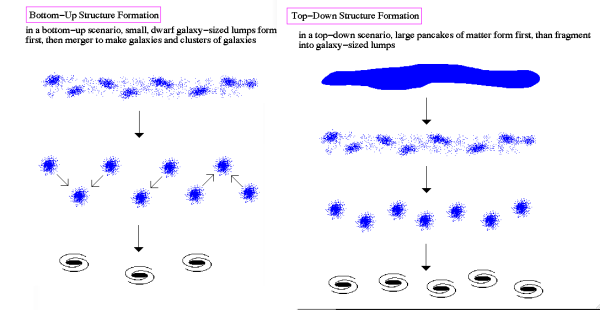 Images credit: James Schombert of the University of Oregon, via http://abyss.uoregon.edu/~js/ast123/lectures/lec24.html.
Images credit: James Schombert of the University of Oregon, via http://abyss.uoregon.edu/~js/ast123/lectures/lec24.html.
"Bottom-up" proponents like Peebles contended that small imperfections in the cosmic structure would form first, creating clusters, then dwarf galaxies, then large galaxies and finally clusters. "Top-down" proponents like Zel'dovich argues for a pancake/fragmentation model, that saw galaxies forming from larger clusters down to smaller scales. Either way would mean the tilt to the scalar spectral index (n_s) would be large, and so n_s would be far from 1. (Either much smaller or much larger.)
What inflation predicted is that the spectrum of initial fluctuations would be nearly scale-invariant, meaning we'd see a combination of top-down and bottom-up in our Universe for where the large-scale power is, and that n_s would be very close to 1. The current value of 0.968 tells us -- from CMB measurements best of all -- that this is correct. I don't know how you think the history of cosmology is different, but I'd love to hear you dig yourself deeper if you're willing.
From BlockThis on Forbes: "Go find out what Forbes is to its nature"
No one is pleased about the security breach. Forbes is not unique to this advertising-served malware, but it's up to them to do something about it. I have contacted them and am awaiting a response.
From Justin on Forbes: "I understand that websites make their money and pay their bills with advertising, and for sites that I trust I have no problem turning adblocker off and looking at their banner ads or what have you, however I do not want to expose my devices to known malware just to read an article (no matter how engrossing it may be).
Is there another site that hosts your full content or is it forbes exclusive now?"
Forbes pays me, so they get the exclusive rights for five full business days. After that, you can read it in full on Medium with no ads. (So, nothing to block.) You have to take the delay, though.
From D.C. Sessions on... surprise... Forbes: "I wanted to read it but Forbes refuses to serve the page, demanding that I turn off the adblocker that I don’t have."
This is a new one! How weird. What are you running that you're getting that? If it's IBM-DOS and Lync... well, I just know there used to be a D.C. Sessions who commented on Starts With A Bang some 7 years ago, but not much since. How ya doin', buddy?
Arp 274, a trio of star-forming galaxies. Image credit: NASA, ESA, M. Livio and the Hubble Heritage Team (STScI/AURA).
And finally, for something cool, Michael Kelsey on antimatter galaxies: "@Ethan re Gary S’s question about antimatter galaxies: See http://arxiv.org/abs/1512.08482 for a recent analysis of a slightly more complex “domain wall” analysis, where the authors consider a smooth (Gaussian) density interface between the hypothetical regions.
They first show that this model entirely escapes the best limits on “domain wall” type backgrounds (from COMPTEL, back in the day!). But what I liked is that they go further, and compute the apparent temperature effects from annihilation, and compare that with Planck data. They end up with a ~50 sigma discrepancy vs. data (chi^2 ~ 2400), which is a great exclusion."
This is a neat paper. Previously, constraints like the one I talked about -- domain walls, uniform structure and lack of gamma rays from annihilation -- were the strongest constraints. But if one concocts a contrived model to evade those, one can still get an even stronger constraint by looking at the (now amazing) CMB!
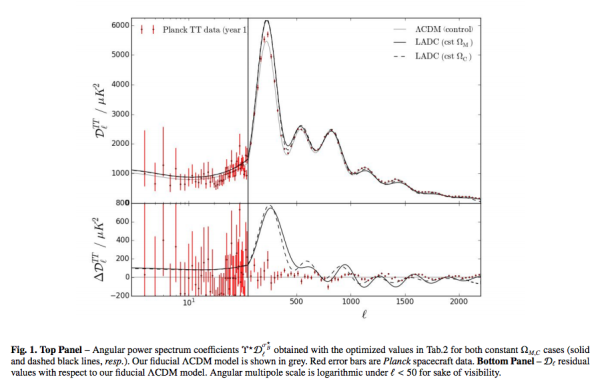 Image credit: J. Baur, A. Blanchard and P. Von Ballmoos, 2015. http://arxiv.org/abs/1512.08482.
Image credit: J. Baur, A. Blanchard and P. Von Ballmoos, 2015. http://arxiv.org/abs/1512.08482.
You cannot make the Universe we see with equal amounts matter and antimatter, and that's final!
Here's looking forward to another great week, and looking forward to seeing you back here for more!

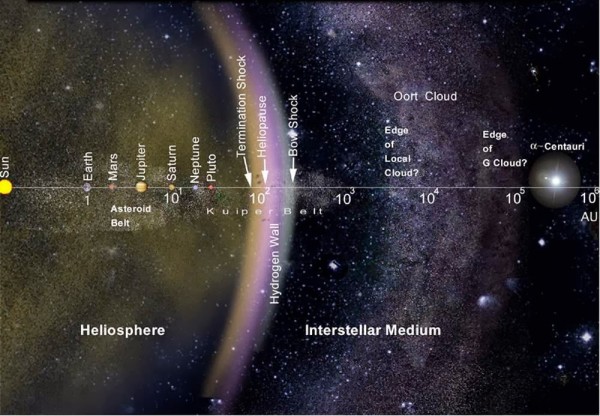
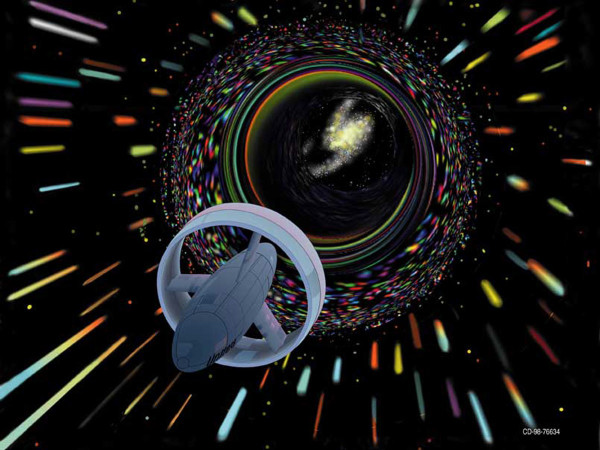
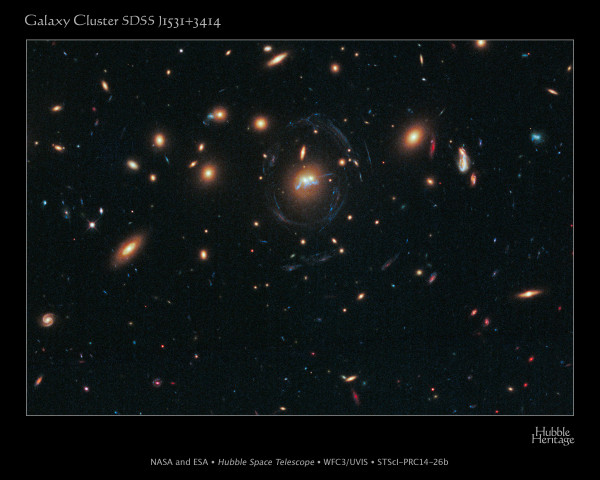



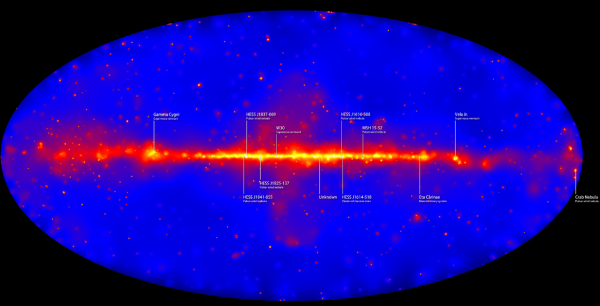
Hi everyone sincerely my apologies for the rant about the malware and the random insults thrown against the well. I had a bit too much to drink when some bozos showed up with beer small hours of the morning because David Bowie is dead man.
I don't drink and can't hold it so as I say, sorry about that.
Hi Ethan - I know people often say it but don't mean it, that being corrected knowledge upgraded at a signifiant level would be welcome. But the truth is most people probably do mean it, in at least a few areas they are active trying to gain knowledge about.
I'm really interested in this. And actually damn impressed by your level of knowledge, which I'm obviously seeing more because I'm reading more. It's really awesome what you were doing back in the 80's from the look. I'm obviously going to study what you've said to be able to understand the relevance to this discussion. But I'll get a lot more besides that, and really, that in itself has mostly short-term entertainment value significance, only.
Doesn't mean it don't matter short term now.
My two items in basic reasoning are this:
You've not that I can see added any weight to your actual assertions which were situated roughly mid-century and involved evocation of sophisticated rich strutures that were 40 years later empirically discovered being predicted in foundational big bang hypothesis. You also threw in the cosmic web, which I'm pretty sure is not explicable in terms of that, in principle. It need dark matter, and at the time that you place all the assertions, dark matter was still in its pre-infancy, in that it amounted to gravity anomalies observed in spirals only.
Early 80's speculation and theorizing doesn't address any of that. And there's no implication in what I asserted about the 80's and 90's that such theorizing would not have gone on. On the contrary I labeled the 80's as the period when the large structure was very much to the fore, as next level resolution astronomy was coming through, prety much throughout the decade and into the 90's.
But what in accumulation is it, that structure and web, as it stands today? It's basically the resultant of all the empirical developments that came through in the 80's and 90's. So my assertion stand on what proportion of those observational discoveries, were predicted in the standard model at any kind of reasonable level of precision to be scientific. and what proportion were wholly unanticipates often shocking developments. I say the great bulk of those revelations were not predicted or expected and were often shocks.
And what then happened, I say, is that the great majority of them were retrospectively explained away with bolt-ons to the standard model. dark matter and dark engineer being the pinups but much more besides that.
I hope you do agree that this is where my assertion stands or falls. And also that you agree that your 1980's case, one struggles to see how that can possibly address your assertions which for begins were situated up to 30 years earlier.
Best
"Hi everyone sincerely my apologies for the rant about the malware and the random insults thrown against the well."
Malware is a problem. And the power imbalance makes you feel that you are stuck no matter what you do. This leads to frustration and that leads to either anger or crying.
Swearing isn't a bad thing. It's an emotional intensifier. Use it for yourself not to attack others.
Insults are also valid where they indicate the disregard or contempt (or whatever) you hold for the one the insult is aimed at.
What you shouldn't do is SOLELY rant and insult and swear, and that's really only "shouldn't" because there is no positive purpose to it, nothing will improve from it.
IMO there's no need to apologise in general, apologies should go to the individual and be specific. The general case should be an acknowledgement of error or failure. IOW own up to the mistake.
If you feel that the problematic action you undertook was wrong, apologising should not be necessary because it won't happen again, you have owned up and realised the error.
The purpose of the public acknowledgement is to say "Lets start again" with the display to be evidence of the wish to do "better", so there should be no need to worry that it's accepting those blaming you were right. The slate will be clean. That further failures will indicate the dishonesty or the lack of ability to undertake the role you proffered will be the only thing you risk.
So don't worry about it: those who will only filter based on holding fast to the past are never going to change and are no loss and do not need to be heeded.
I will point you to this resource for how to ask questions, others will provide their own advice if they feel it necessary.
http://www.catb.org/esr/faqs/smart-questions.html
Ethan, it's still IMO necessary to let Forbes know that people are willing to look at ads (see newspapers), but how much advertising they will accept is not the same for all people, but at some stage NOBODY wants adverts of some level of obnoxiousness.
Increasing the invasiveness of adverts in response to lower viewing is no different to jacking up the price of a periodical because the sales have dropped. It only accelerates the crash.
Forbes want adverts, we want they have to show beside the ads. Forcing ads on us won't work, only pissing us off. Cut back on that and fewer people will be pushed into ad blocking. If the industry cleans its act up, people will eventually be convinced they can unsecure their browser once more.
There IS a way everyone can get some of what they want.
At the base of it is stop treating your customers like consumers. The former can, and will, leave when abused, the latter must consume and have no choice and therefore abused with no thought.
Ethan:
I have a suggestion which may help your readers and requires no technical fix, though Forbes may not like it.
I suspect that like me, many of your readers click on your posts here, read the synopsis, and then click on the link if they want to read more. This sends us to Forbes even if the 5-day exclusive period has passed. You no longer have direct links to Medium in your articles. My suggestion would be to put them back in. Include a second link at the bottom of each synopsis that leads to Medium. It could even specify the date. Example:
[Forbes link] Come find out how we determined it all on this week’s Ask Ethan!
[new add] Or read it here ad-free after January 14 2016!
First I want to say that I am happy to know that an outlet such as Forbes has recognized the value of Ethan's creative work and is willing to pay him for it. I also give kudos to Forbes for trying to figure out how to make money so they can pay content creators.
That being said, I much prefer the advertisement free experience and don't much like the idea of drive-by malware attacks. Here is what I do:
I'm using the Firefox browser with the NoScript add-on. I don't use any ad blockers.
After being forwarded to the Forbes welcome screen, allow forbes.com and forbesimg.com in NoScript by clicking on the Options button in the lower right corner of the browser window.
If it works, then great! If it says you have an AdBlocker, then delete all cache and cookies. That is done by hitting Cntl-Shift-Del and checking the Cache and Cookies boxes.
Close the Forbes tab, go back to Ethan's link and click it again.
Now it should take you to the welcome screen, count down from 3, and take you right to the article with no advertisements.
Once you've set it up once, it should just work from then on.
Not using ad blockers means that you can still be served up malware.
@Wow #6
Not without javascript. The same NoScript javascript blocks that prevent the ads from showing also prevents drive-by downloads.
When I look at the page, only the forbes.com and forbesimg.com scripts are allowed. The other 19 scripts sources Forbes has put on the on the page are all blocked.
No, there are viruses that payload on jpegs and other "non executable" items.
Not as many? Sure, but they're there.
@Wow #8
First, the same NoScript javascript blocks that prevent the ads from showing also would also prevent the download of any compromised images served up by advertisers.
Secondly, even if an infected image was downloaded it wouldn't do anything because the Firefox rendering engine does not execute image code.
Lastly the type of exploit you are describing requires either the host machine to be already compromised with an extractor, or uses deception to make an executable look like an image file to a user who then clicks on it. While it is possible if you are clicking on "images" received in email via an unpatched version of Outlook 2002, steganographic images or other non-executable items on a website as viewed in a web browser cannot initiate an infection. For that, you need Javascript (or ActiveX).
"Lastly the type of exploit you are describing requires either the host machine to be already compromised with an extractor,"
No, it only requires an exploit-feasible viewer.
No different from dowloading a word document with a virus on a word doc reader that is vulnerable.
If you want to risk it, then fair enough, your problem.
It's wrong to palm off the risk onto others just because you can't be arsed, though.
The best answer is not to go, if you don't want to use ad blocking. Just don't "buy".
@Wow #10
I'm calling BS. Show me a single write-up from anyone credible detailing an exploit that can be made exclusively from a JPG via a web browswer. Bonus points if you can find one that works against the Mozilla/Firefox engine which you seem to think is so exploitable.
Before you trot out Perrun, notice it requires the host machine to be infected with Extrk.exe or Textrk.exe before viewing.
I wouldn't put it out there if it was a risk to others. Although protecting against such things is not my profession any longer, I still know enough about the landscape to spot someone who is talking out of their ass.
Call BS all you like, dearie. I’ll not try to blow your mind by posting links to common knowledge. Fuck up your own computer.
Don’t try to make others be a vector for more viruses just because you’re a stupid cunt. Or a virus writer. Or just want company in your misery. Or whatever the reason you have for not wanting other people to be careful.
Hi Ethan,
I've been able to assemble some data now, and was returning to settle this matter. However you haven't answered my "digging myself in deeper" points in the first comment.
What you said in the actual post did not add anything to your original claim which was about a period up to 30 years earlier.
Until I know where you stand at this point, I won't know what of the assembled historical facts shall be useful in resolving this discussion.
Now you definitely threw down the gauntlet in your published post. And I have gone to a little effort (not that much to be fair).
So you threw it down; does your lack answer here mean you have conceded? Is that reflected in the original post?
Chris, you will either have to do the work yourself or stop pestering Ethan with demands that he prove you right or you'll call him a meanie and wrong.
Hi Wowowowow,
I mostly don't read your comments now, but can't help noting regarding the current discussion with Ethan, that since my last comment to you, your subsequent comments have gone to 100% pure vacous bad-mouthing. Not a single attempt to defend or challenge a single point. I think that speaks for itself. I'd suggest people in future if they can be arsed to read you balava, read with their psychological cap, in terms of more or less what you think of yourself.
Chris, I only read yours for the refueling of my cynicism about the stupidity of mankind.
YOU go ahead and "prove" your clam which I personally know to be a complete bloody lie. Myself as well as Ethan will get the popcorn out as you tie yourself into knots in dark painted-in corners of the internet in your attempt to find out "evidence" of your asinine claim.
What we WON'T get popcorn out is you going "Nuh, uh, you have to prove me wrong first! And I totally haz proves!".
Note: I didn't even finish your first sentence, the tone was set enough already that you weren't going to actually do any work in proving your bare-faced lie had some basis in reality, weak as that evidence might be.